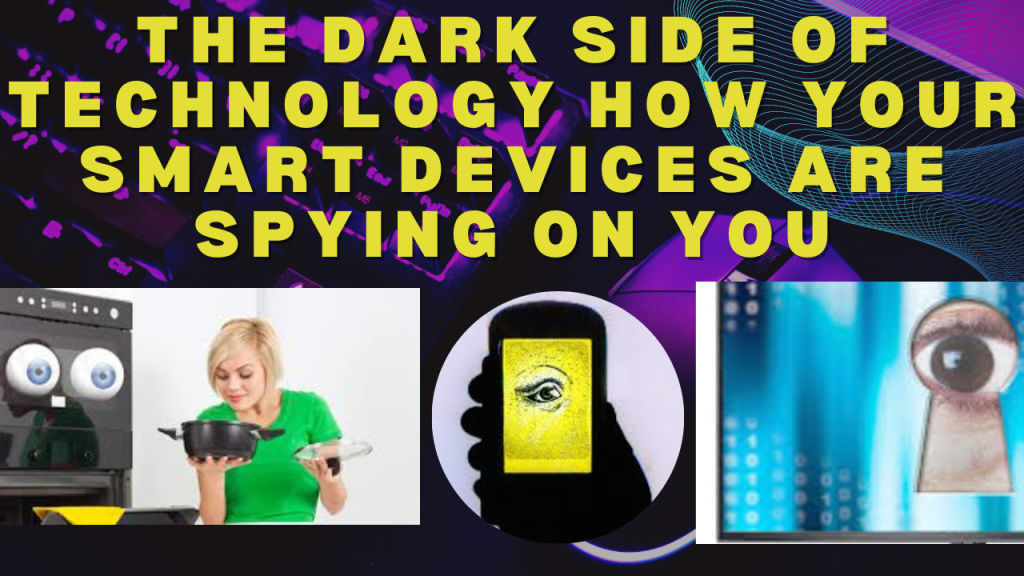The Dark Side of Technology: How Your Smart Devices are Spying on You
The Dark Side of Technology

With the advancement of technology, the world has become a more connected place than ever before. The rise of smart devices, such as smartphones, laptops, smart TVs, and other IoT-enabled devices, has made our lives more convenient and productive. But, at the same time, it has also exposed us to a new level of vulnerability.
Smart devices are designed to collect and analyze data to provide personalized experiences, but at what cost? Many of these devices are constantly collecting data on our behavior, preferences, and location. This data can be used to target us with personalized ads or sold to third parties for various purposes.
In this article, we will explore the dark side of technology and how smart devices are spying on us.
Data Collection by Smart Devices
Smart devices collect data in various ways, from tracking our location to analyzing our online behavior. Let's take a closer look at some of the most common ways smart devices collect data:
Location tracking: Most smartphones and other mobile devices are equipped with GPS technology that allows them to track our location. This data is used to provide us with personalized recommendations for nearby restaurants, events, and other activities. However, it can also be used to track our movements, which can be a privacy concern.
Online behavior tracking: Smart devices can collect data on our online behavior by tracking our browsing history, search queries, and social media activity. This data is used to provide personalized ads and recommendations, but it can also be used to build a detailed profile of our interests and preferences.
Voice recognition: Smart speakers and virtual assistants, such as Amazon Echo and Google Home, are designed to respond to our voice commands. To do so, they must constantly listen for our voice. This means that they are collecting data on our conversations and can potentially record sensitive information.
Biometric data: Some smart devices, such as smartwatches and fitness trackers, collect biometric data, such as heart rate and sleep patterns. This data can be used to provide personalized health recommendations, but it can also be used to track our movements and activities.
Privacy Concerns
The collection of data by smart devices has raised several privacy concerns. Here are some of the main issues:
Data breaches: Smart devices are connected to the internet, which means that they are vulnerable to cyberattacks. Hackers can gain access to our personal data, including our passwords, credit card information, and other sensitive information.
Targeted advertising: Smart devices collect data on our behavior, which can be used to target us with personalized ads. While some people may find this helpful, others may feel that it is an invasion of their privacy.
Government surveillance: Governments can use smart devices to spy on their citizens. For example, in China, the government has installed cameras with facial recognition technology in public places to monitor people's movements.
Hacking: Smart devices can be hacked, which means that hackers can gain access to our personal data, including our photos and videos.
Lack of transparency: Smart devices often collect data without our knowledge or consent. This lack of transparency can be a concern for people who value their privacy.
How to Protect Your Privacy
While it may be difficult to completely avoid the collection of data by smart devices, there are steps you can take to protect your privacy:
Read the privacy policy: Before using a smart device, read the privacy policy to understand what data it collects and how it is used.
Use strong passwords: Use strong, unique passwords for each of your devices and accounts.
Disable location tracking: Turn off location tracking for apps and devices that do not require it.
Limit data sharing: Limit the amount of data you share with third-party apps and services.
Use encryption: Use encryption to secure your data. Encryption scrambles your data so that it cannot be read by anyone without the correct decryption key.
Use a VPN: Use a virtual private network (VPN) to encrypt your internet traffic and protect your online privacy.
Keep your devices updated: Keep your devices updated with the latest security patches and software updates to protect against known vulnerabilities.
Use two-factor authentication: Use two-factor authentication to add an extra layer of security to your accounts.
Disable unnecessary features: Disable features that you do not need, such as voice recognition or biometric data collection.
Be mindful of what you share: Be careful about what you share online and on social media, as this information can be used to build a profile of your interests and preferences.
Conclusion
Smart devices have brought many benefits to our lives, but they also come with risks. The collection of data by these devices can be a privacy concern, and it is important to take steps to protect our personal information. By being mindful of what data we share and taking steps to secure our devices, we can enjoy the benefits of technology while minimizing the risks.
About the Creator
nizam uddin
My name is Nizam Uddin and I am thrilled to be a part of Vocal.com's community of writers. As a passionate technology enthusiast, I am excited to share my insights and opinions on the latest trends and innovations in the world of tech.
Enjoyed the story? Support the Creator.
Subscribe for free to receive all their stories in your feed.






Comments
There are no comments for this story
Be the first to respond and start the conversation.